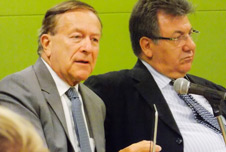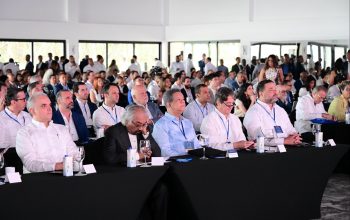news
Panel on Youth Unemployment Calls for a People-Centered Approach to Development that Emphasizes Education, Training and Opportunity
July 11, 2012
On Monday, July 9, Global Foundation for Democracy and Development (GFDD) organized the side event "The Financial Crisis and its Impact on Youth Unemployment," in partnership with the Permanent Mission of the Dominican Republic of the United Nations, the Office of the President of the Sixty-Sixth Session of the General Assembly of the United Nations, and the NGO Committee on Financing for Development, during the framework of the 2012 High Level Segment of
ECOSOC, at the United Nations Headquarters in New York.
The objective of the panel discussion was to examine how the global financial and economic crisis has accelerated chronic unemployment and social exclusion for many of the world’s youth. Panelists discussed challenges and best practices aimed at creating better and more sustainable opportunities for young people across the globe.
This topic is particularly salient as the world continues
to face an exacerbating youth employment crisis, with youth being three times more likely than adults to not have access to jobs. Today, over 75 million young people are in search of quality work.
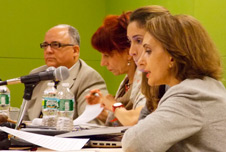
The side event, moderated by Hanifa Mezoui, Civil Society Special Coordinator to the President of the Sixty-Sixth Session of the General Assembly,
featured welcome remarks by Counselor Francisco Álvarez of the Mission of the Dominican Republic to the United Nations and Asuncion Sanz, Director of the GFDD DC Office, and presentations by international experts: Navid Hanif, Acting Director, Office for ECOSOC Support and Coordination, UNDESA USG; María de Lourdes Cabrera, Director General of Employment, Dominican Ministry of Labor; Gaetano Cavelierri, President of CIBJO (The World Jewellery Confederation); Francois Loriot, President of
AIFOMD (International Associatio of MDG/CSR trainers); and Victor Ovalles-Santos, Expert on Multilateral Negotiations on behalf of the South.
Counselor Francisco Álvarez
Counselor Álvarez affirmed that in addition to confronting high global unemployment rates, we are also facing a lack of decent jobs as well. The Dominican Republic, like countries throughout the globe, is not immune to this phenomenon. While the country has
been able to reduce the unemployment rate, 30 percent of the youth population remains unemployed.
"Most governments cannot provide young people with more jobs," conveyed Counselor Álvarez. "It’s not sustainable. The private sector has an important role to play. Young professionals are seeking entry level positions and on numerous [occasions] companies do not hire them, stating that they are looking for a persons with
experience."
The Counselor of the Dominican Mission of the Dominican Republic underscored the important findings unveiled in the report of the Committee on Youth Employment during the 101st International Labour Conference of the International Labour Organization (ILO) convened in Geneva in May of this year. "Unless something is done immediately to tackle this issue," declared the Counselor, "we are on the verge of having a lost
generation in every context."
Asuncion Sanz
Asuncion Sanz spoke about GFDD and FUNGLODE’s commitment to promoting the formulation of public policies and actions aimed at advancing education, professional training and labor force capacity.
"We recognize that education and professional development are fundamental to increasing employability of youth and vulnerable populations and
to labor market insertion," expressed Sanz. "Since the year 2000, we have been partnering with the public and private sectors, civil society and academia to realize professional training sessions, internships, courses and degree programs, as part of our mission to contribute to the advancement of sustainable social, economic, democratic and cultural development in the Dominican Republic and around the world."
The Director of the GFDD DC Office
explained that, through its internship program InteRDom, GFDD possesses a decade of accumulated experience coordinating and implementing internships in 14 fields that have been identified as critical development areas by the Ministry of Labor of the Dominican Republic.
"In an effort to replicate best practices, InteRDom provides orientation, guidance and certification to our over 500 affiliated public, private and non-profit sector institutions, equipping them
with the know-how to optimize the contribution of interns to their organizations," asserted Sanz. "We argue that internships, when used as a development tool, can help to bridge social and demographic divides, providing young people the ability to obtain quality work experience that is beneficial to their professional futures, at a low level of compromise, such as studying."
She emphasized that internships serve to foster a critical transition
from school to the labor market, providing young people with the skills desired by employers, frequently not acquired via formal channels of education. Sanz also endorsed the innovative actions taken by the Ministry of Labor of the Dominican Republic to improve youth employability and labor force capacity through its numerous programs designed to benefit young people.
Navid Hanif
Navid Hanif discussed the measures being put
forth by ECOSOC to address the youth unemployment crisis, and the shift in thinking away from purely macroeconomic indicators towards a people centered approach to development. The Acting Director for the Office for ECOSOC Support and Coordination explained that this philosophical change that occurred in the 1990s, within the United Nations and the World Bank and other institutions, is largely attributed to the contributions of pioneering economists and social welfare advocates Mahbub ul
Haq and Amartya Sen.
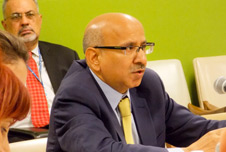
Hanif underscored that these two thinkers acknowledged the reality that: unless development focuses on people, development does not work.
Sen argues that there are two important reasons to place people at the center of development. The first is the evaluative reason and the second is the effectiveness
reason. Development should be evaluated in terms of people’s lives; and if people’s lives are not improving, the policies are not effective. Hanif explained that this is what ECOSOC is talking about this year: how to deliver effective development.
"While it should be obvious," posited Hanif, "it took us more than half a century to understand that people should be at the center of development."
The
economic development expert adamantly declared that current economic models are not working. "The current models that are based on macroeconomic indicators, on interest rates, on inflation rates are not working at all. We need to rethink macroeconomic policies, and structural social protection and the provision of basic services to the poorest of people. This is a message which is unambiguously clear from ECOSOC."
Another message coming from ECOSOC is
that governments must be accountable to their people, in a way that is transparent. The Acting Director for the Office for ECOSOC Support and Coordination also accentuated the urgent need for development that is sustainable. "If we do not move on to the path of sustainable development," stated Hanif," we may have no path to go forward."
He also maintained that ECOSOC should be a platform for youth. He referred to the Youth Forum
convened by the President of ECOSOC, which united youth from more than 50 countries from around the world. Hanif described the current reality as "very disturbing." "They are deeply dissatisfied with the kind of world that we are leaving from them. They are anxiously concerned about their jobs. They are graduating from their colleges and they have nothing to look forward to."
In conclusion, Hanif underscored that ECOSOC is looking to
the non-governmental organizations to help address the social, economic and ecological challenges confronting us. "We rely on your effective and active participation. We hope you will continue to engage."
María de Lourdes Cabrera
Ms. María de Lourdes Cabrera presented the active labor market policies and strategies that have been put into effect by the Ministry of Labor of the Dominican Republic over the
last 10 years. Cabrera asserted that while the economy experienced growth over the last decade, this growth has not translated into increased and improved employment opportunities.
According to Cabrera, since the 2008 global economic and financial crisis, the number of young people engaged in the informal sector has increased. The Director General of Employment expressed that the rate of youth unemployment is concerning, averaging 11.7.8 percent throughout the last
decade. Young people in the Dominican Republic are two to three times more likely to be without work than adults, and young women are more likely to be unemployed then young men.
Cabrera outlined four key programs making an impact on the lives of young people in the Dominican Republic: the Youth Development Program, the Internship Program, the Second Chance Program and the National Employment Service.
The Youth Development Program works to provide
skills training to youth with disabilities. "Through the Youth Development Program we have benefitted over the last 10 years, more than 72,000 people – around 55-60 percent are women. We have applied an impact evaluation with the assistance of the Inter-American Development Bank and the World Bank. The Program has changed lives," confirmed the employment expert.
Approximately 32 percent of the young people that participate in the Ministry’s
Internship Program receive job offers upon completion of their internship experiences, but as per Cabrera, only 16 percent accept. "When we asked them why they did not accept the offers," explained Cabrera," they said: ’I think I can do better in life. I’m going to go back to school.’"
As the Director General of Employment mentioned, the Ministry of Labor is making strides in this area too. Through the
Second Chance Program, a joint initiative with the Ministry of Education, young men and women that abandoned school have the ability to attend classes and earn their high school diploma. About 33 to 35 percent of those who benefited from the youth employment project have decided to go back to school.
The Ministry of Labor’s National Employment Service, which has been operating for the last five years, has registered approximately 140,000 people, 25 percent of
which are between the ages of 18 and 24. Through this program, representatives of the Ministry visit schools on a weekly basis to discuss topics related to labor market insertion such as how to prepare a CV, tips for interviewing, and how to dress.
Regarding recommendations and future action, Cabrera stressed the need for heightened engagement and coordination between the Ministries of Labor, Education and Health.
"We have to link active
employment strategies with social protection policies," she stressed. "We have to make people study, prepare themselves and get to the labor market. That’s the only way to really have an impact on the social and economic situation of people."
She also discusses the draft of a law to address youth unemployment underway in the Congress.
Gaetano Cavelierri
Gaetano Cavelierri discussed the International Jewellery Federation (CIJOB)’s focus on people-centered development. The Federation, established in Paris in the year 1926, represents national associations worldwide related to all phases of production, from
mine to retail. CIJOB represents over 6 million companies, 43 countries and around 40 million people working in the industry. The Federation establishes corporate social responsibility and ethical guidelines.
Cavelierri cited two examples in which CIJOB has changed the lives of people in Botswana and China.
Thanks to pressure placed by CIJOB on a mining company in Botswana, the Federation was able to transform life for the people of this community.
"We totally changed life in that country," stated the President of the International Jewellery Federation. "Twenty or twenty-five years ago, there only three kilometers of normal road and per capita income was between US$1-3. Today, there are 25,000 kilometers of normal road and per capita income is between US$ 13,000 to $15,000."
CIJOB was also instrumental, in 2004 and 2005, in lobbying for the rights of miners in China affected by
silicosis, helping them to receive heavy compensation.
He also spoke of the Federation’s commitment to protecting the rights of children, and referred to its work to lift children out of desperate situations in countries throughout the world.
Francois Loriot
Francois Loriot discussed AIFOMD (International Association of MDG/CSR trainers)’s mission to promote awareness and understanding
of the Millennium Development Goals and the Millennium Declaration. AIFOMD has created groups of experts from the United Nations and the private sector tasked with providing training to nongovernmental organizations, universities and institutions across the globe, teaching professionals and students about the importance of the MDGs, the Global Compact principles and corporate social responsibility. The Association has also created centers of excellence that provide participants with
economic and social skills that related closely with the MDGs.
"There is no way that in the next decades that companies, firms and employees will be able to compete outside of these basic ethical standards. So it is important that universities and institutes train people on the MDGs, corporate social responsibility and the Global Compact principles. That’s what we have been doing," stated the President of AIFOMD.
Victor Ovalles-Santos
Victor Ovalles-Santos inserted the perspective of the Member States into the discussion. Ovalles-Santos called attention to two critical obstacles facing young people to a heighten extent as a result of the ongoing global economic and financial crisis: the challenge of obtaining adequate education and training, and the wide-scale reduction in wages due to the contraction of the world economy.
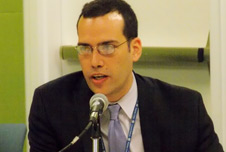
He affirmed that effective policy must incorporate education, finance and innovative job creation. He also highlighted the role of civil society in fomenting change: "Social movements, social responsibility, civil society, academia all have a very important role in establishing the conditions for creating employment opportunities for youth and investment in
jobs."
In relation to a model that works, Ovalles-Santos pointed to the model implemented by Scandinavian countries. "We recognize that there is a model which has worked in Scandinavian countries. It’s a model that works and there is full education and full access to health, and there is a very important framework. So it is not something that cannot work with market principles, it just simply needs the role of government to balance
it," emphasized the expert on multilateral negotiations.
He concluded by stressing that job creation is fundamental to eradicating poverty and promoting social inclusion in developing countries.
GFDD, FUNGLODE and ECOSOC
The coordination of this panel is part of a larger commitment
by GFDD and FUNGLODE to contribute to ECOSOC’s agenda of work. GFDD and FUNGLODE support the United Nations and its different agencies in carrying out their missions and achieving their goals. In 2004, GFDD and FUNGLODE were admitted to the United Nations System as institutions with consultative status, joining the Economic and Social Council (ECOSOC), the United Nations Conference on Trade and Development (UNCTAD), the Department of Public Information (DPI), the Global Compact
Office (UNGC), and the World Summit on the Information Society (WSIS).
Related links:
www.interdominternships.org
http://www.un.int/wcm/content/site/dominicanrepublic
http://www.ngosonffd.org/
http://www.ministeriodetrabajo.gob.do/
http://www.un.org/en/ecosoc/julyhls/index12.shtml
